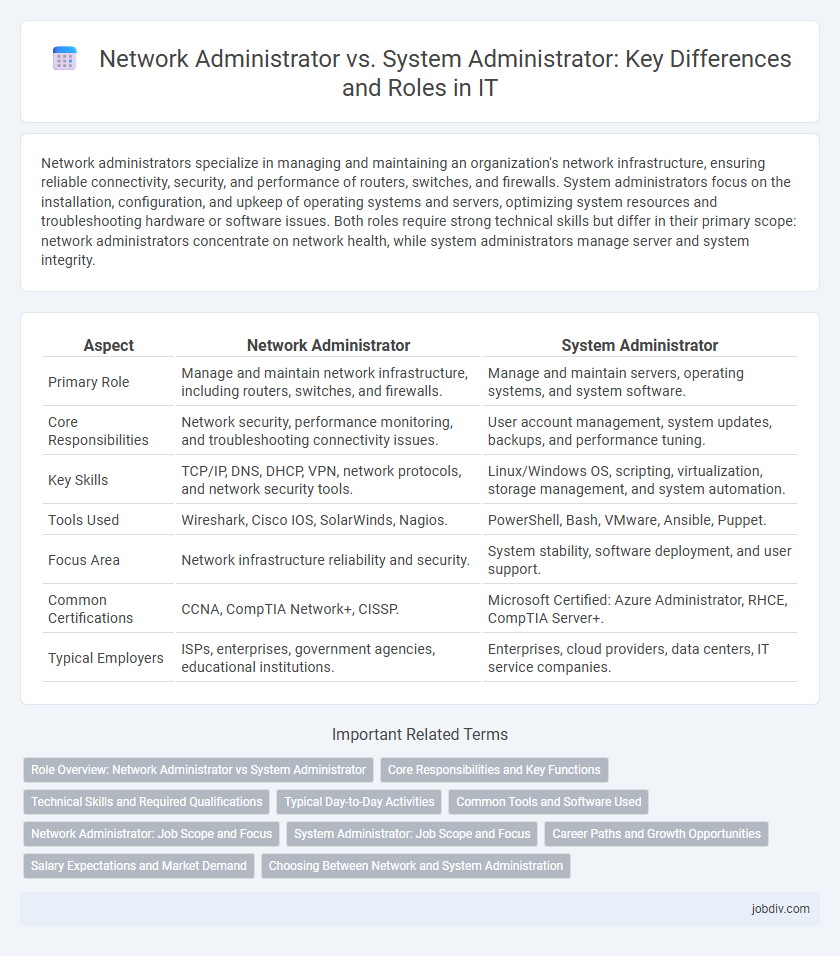Network administrators specialize in managing and maintaining an organization's network infrastructure, ensuring reliable connectivity, security, and performance of routers, switches, and firewalls. System administrators focus on the installation, configuration, and upkeep of operating systems and servers, optimizing system resources and troubleshooting hardware or software issues. Both roles require strong technical skills but differ in their primary scope: network administrators concentrate on network health, while system administrators manage server and system integrity.
Table of Comparison
| Aspect | Network Administrator | System Administrator |
|---|---|---|
| Primary Role | Manage and maintain network infrastructure, including routers, switches, and firewalls. | Manage and maintain servers, operating systems, and system software. |
| Core Responsibilities | Network security, performance monitoring, and troubleshooting connectivity issues. | User account management, system updates, backups, and performance tuning. |
| Key Skills | TCP/IP, DNS, DHCP, VPN, network protocols, and network security tools. | Linux/Windows OS, scripting, virtualization, storage management, and system automation. |
| Tools Used | Wireshark, Cisco IOS, SolarWinds, Nagios. | PowerShell, Bash, VMware, Ansible, Puppet. |
| Focus Area | Network infrastructure reliability and security. | System stability, software deployment, and user support. |
| Common Certifications | CCNA, CompTIA Network+, CISSP. | Microsoft Certified: Azure Administrator, RHCE, CompTIA Server+. |
| Typical Employers | ISPs, enterprises, government agencies, educational institutions. | Enterprises, cloud providers, data centers, IT service companies. |
Role Overview: Network Administrator vs System Administrator
Network administrators manage and maintain an organization's network infrastructure, including routers, switches, firewalls, and VPNs, ensuring seamless data communication and network security. System administrators oversee the deployment, configuration, and maintenance of servers, operating systems, and software applications to guarantee optimal system performance and reliability. Both roles collaborate to support IT environments but specialize in distinct areas: network connectivity versus system functionality.
Core Responsibilities and Key Functions
Network administrators manage and maintain an organization's network infrastructure, including routers, switches, firewalls, and VPNs, ensuring seamless connectivity and security. System administrators focus on the configuration, maintenance, and optimization of servers, operating systems, and software applications to ensure reliable performance and availability. Both roles require expertise in troubleshooting, user support, and system monitoring but differ in their primary scope of network versus system resources.
Technical Skills and Required Qualifications
Network Administrators require expertise in network protocols, routing, switching, and firewall configuration, often holding certifications like Cisco's CCNA or CompTIA Network+. System Administrators specialize in operating systems management, server maintenance, virtualization, and scripting, commonly certified with Microsoft Certified: Windows Server or Red Hat Certified System Administrator (RHCSA). Both roles demand strong problem-solving skills, knowledge of security practices, and proficiency in monitoring tools to ensure optimal IT infrastructure performance.
Typical Day-to-Day Activities
Network Administrators monitor and maintain network infrastructure, manage routers, switches, firewalls, and troubleshoot connectivity issues to ensure optimal performance. System Administrators focus on managing servers, deploying software updates, configuring operating systems, and maintaining system security through patches and backups. Both roles require constant monitoring and problem-solving to maintain seamless IT operations and minimize downtime.
Common Tools and Software Used
Network administrators frequently utilize tools such as Wireshark, Cisco IOS, and SolarWinds for network monitoring, configuration, and troubleshooting. System administrators often rely on software like Microsoft System Center, Puppet, and VMware vSphere to manage servers, automate tasks, and maintain system performance. Both roles commonly use remote access tools like SSH and management consoles to ensure smooth operational workflows and security.
Network Administrator: Job Scope and Focus
Network administrators specialize in managing and maintaining an organization's network infrastructure, including routers, switches, firewalls, and VPNs to ensure secure and efficient data communication. Their responsibilities include monitoring network performance, troubleshooting connectivity issues, configuring network hardware, and implementing security protocols to prevent unauthorized access. This role requires expertise in network protocols such as TCP/IP, DNS, DHCP, and experience with network monitoring tools to optimize network reliability and uptime.
System Administrator: Job Scope and Focus
System administrators primarily manage and maintain an organization's IT infrastructure, including servers, storage, and operating systems, ensuring system stability and security. They handle system updates, patch management, user account administration, and backup solutions to optimize performance and prevent data loss. Their focus extends to troubleshooting hardware and software issues, configuring system settings, and implementing security policies to safeguard critical assets.
Career Paths and Growth Opportunities
Network administrators specialize in managing and maintaining an organization's network infrastructure, focusing on tasks such as configuring routers, switches, and firewalls to ensure secure and efficient data flow. System administrators handle the installation, support, and maintenance of servers and operating systems, playing a critical role in optimizing system performance and reliability. Both career paths offer growth opportunities into senior roles like IT manager or infrastructure architect, with advancement often requiring certifications such as Cisco CCNA for network administrators and Microsoft Certified Solutions Expert (MCSE) for system administrators.
Salary Expectations and Market Demand
Network administrators typically earn between $60,000 and $90,000 annually, with demand driven by the need for maintaining robust and secure corporate networks. System administrators command salaries ranging from $65,000 to $95,000, reflecting their broader responsibility for overall IT infrastructure management and server maintenance. The market strongly favors system administrators due to their versatile skill sets essential for hybrid cloud environments and complex system integrations.
Choosing Between Network and System Administration
Choosing between network administration and system administration depends on your interest in managing network infrastructure, such as routers, switches, and firewalls, versus overseeing servers, operating systems, and software applications. Network administrators specialize in ensuring secure, efficient data communication and connectivity, while system administrators focus on maintaining system performance, user access, and patch management. Understanding the distinct technical skills and daily responsibilities enables informed career decisions tailored to organizational IT needs.
Network Administrator vs System Administrator Infographic

 jobdiv.com
jobdiv.com